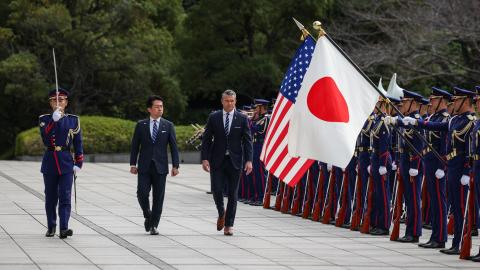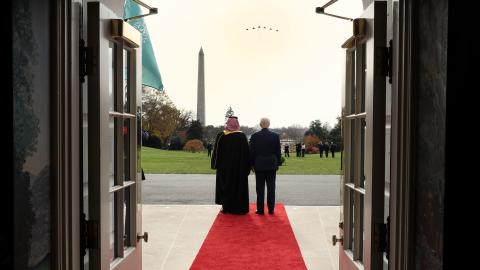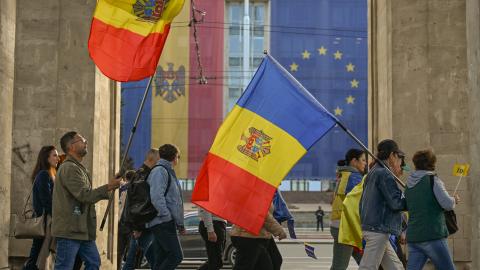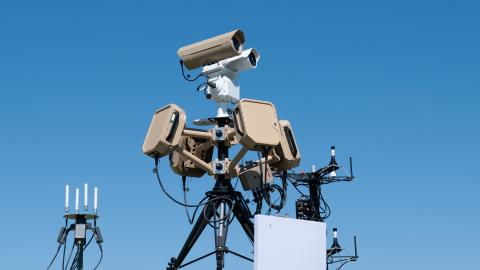Damascus — The biggest problem getting out of Lebanon was at the Syrian side of the border where, as my traveling companion quipped, we were delayed by the "kind of mayhem that mocks the idea of a police state." Charles is a 25-year-old Lebanese-American, and the collective anxiety of people wanting to get out of the war zone had clearly taken a toll on him.
There were other Lebanese-Americans at the border, a group of young women overwhelmed by the lack of order. "What is everyone's problem?" the girls asked. "We're all going to get out of here and the more patient and calm everyone acts the better." These Americans probably now understand why their parents left the old country, and perhaps why they shook their heads sweetly when the girls said they wanted to go back for the summer to study Arabic and engage their heritage more directly.
In fact, the chaos at the border was intentional. The desk for Syrians entering the country was well-staffed, so that line was short and quick. But since anyone holding foreign passports could afford to pay handsome bribes, security officials had a vested interest in making sure the other line was a mob scene.
It may be that the best life in an Arab regime is as a member of the mukhabarat. It is not simply because of the power that the internal security services exercise over the lives of their fellow citizens, and that if they are the agents of violence it is less likely they will suffer it at someone else's hands. The fact is that the lives of everyone else are characterized by having to wait for scraps to be tossed your way by an indifferent state. You can wait in line for three hours everyday for everything for your entire life, or you can join the mukhabarat and get decent service.
"Charles Malik wrote that the life of the average Israeli is worth 1,000 times more than that of the average Arab," says my friend Fawaz. Malik is one of his heroes, a Lebanese intellectual who was a leading figure in the drafting and adoption of the 1948 Universal Declaration of Human Rights. "Malik wasn't talking about the moral value of a human life; of course all human lives are equal in that way. He was speaking in scientific terms. The Israelis invest in the lives of their citizens, their healthcare, their education. Malik made that calculation back in 1948, maybe it is double or even triple that now."
European officials and Western journalists have wondered about the "disproportionate" Israeli response to the abduction of two IDF troops and the killing of another eight. Obviously, the Israeli siege is about much more than the events of recent weeks, but the more important point is that to talk of proportionality" is a brutal calculus. It assumes that it is acceptable to trade one life for another, so long as no one overdoes it and upsets the balance sheets.
This is the mindset of the vendetta, the blood-debt; it is tribal thinking and it is repugnant to hear the citizens of Western democracies submit to it. Democracies wage wars to show that the cost of taking another human life, any human life, is so high that no one should dare try it. This is why the Europeans are afraid of conflict; they regard the lives of their own dearly even while they seem to reckon the existence of others on a ledger sheet.
But in terms of human calculus, it is not the IDF who has put a price on Israeli soldiers; rather it is Hezbollah who believes that any number of innocent lives, any amount of destruction is worth it to make Jews suffer.
Thus the Lebanese do not have leadership as Charles Malik might have wished it for his young country half a century ago. Instead, Lebanon has the Islamic resistance. Much has been made of Hezbollah's willingness to step in where the central Lebanese government has all but ignored the Shiite community, offering social services, healthcare, and educational programs (though it is bizarre to believe that an education preparing students for martyrdom is a useful good). And yet after dragging their country to war, Hezbollah now seems to have forgotten even about the downtrodden Shiites they boast of protecting.
"No one from Hezbollah did anything for all these families that have had to flee the south," Fawaz says. "If there's one upside to what is not only a catastrophe for the country and its infrastructure, but is also quite clearly now a humanitarian disaster, it's that other Lebanese stepped in where neither the government nor Hezbollah did a thing. We have people even from Christian communities giving money, and housing displaced Shiites. That's a hopeful thing."
















